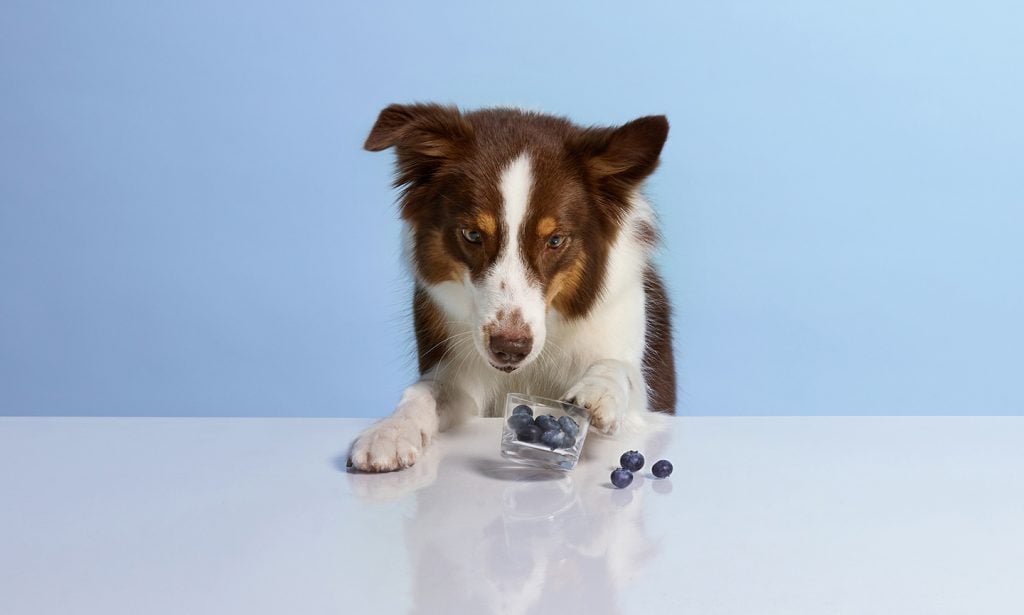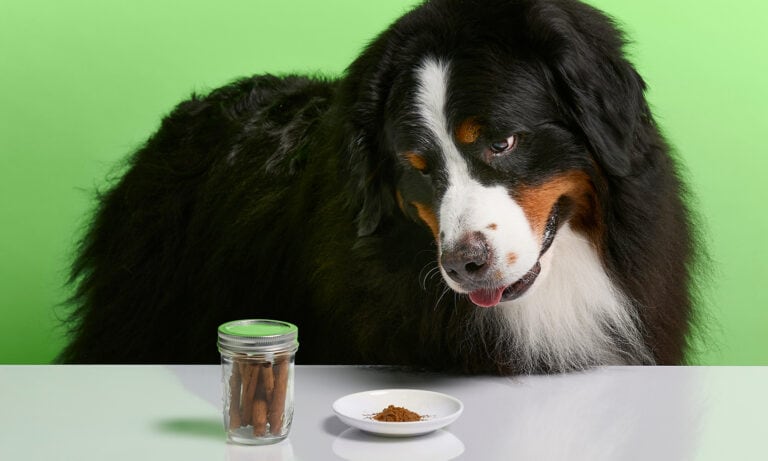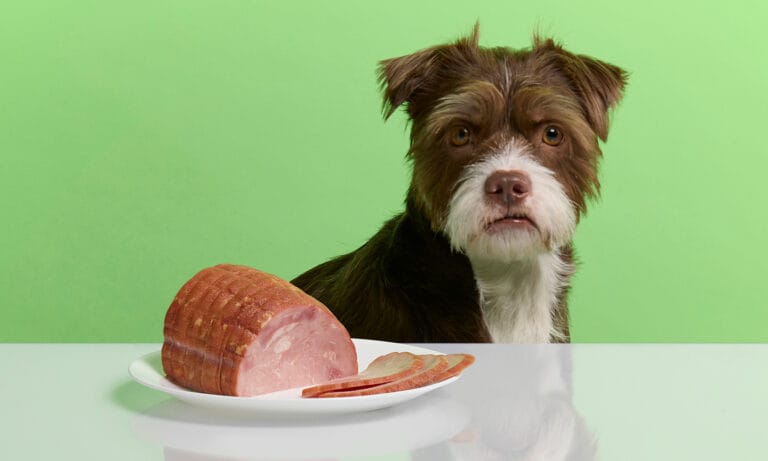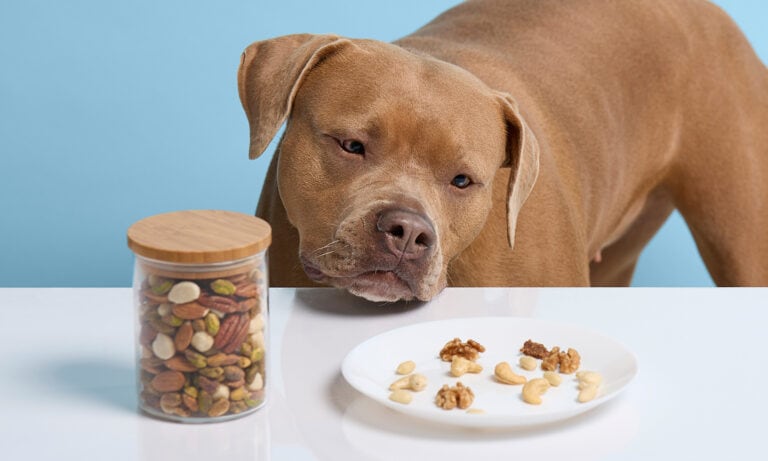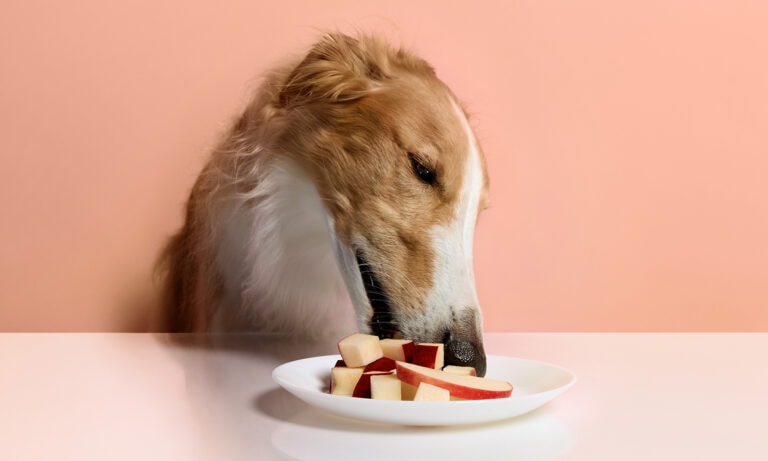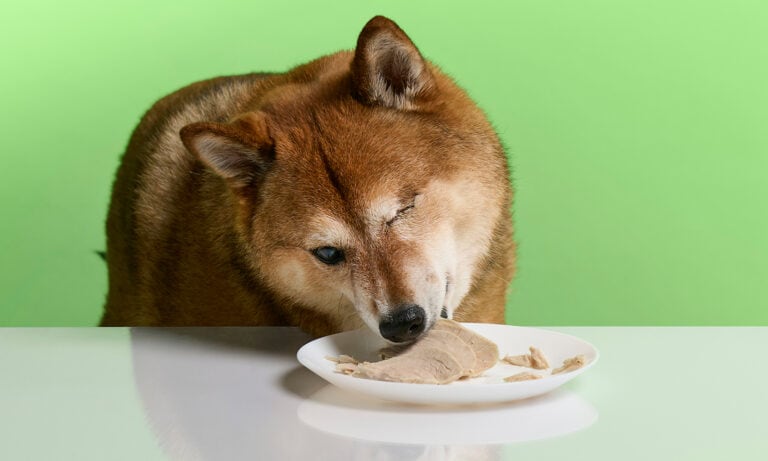Dogs are loyal companions, so it’s only natural that we want to treat them like part of the family and share some of our favorite human foods with them. Although not all human foods are safe for dogs, a surprising number are A-OK for dogs to eat and even beneficial for your pup.
We spoke with vet experts about 23 human foods dogs can eat—and the nutritional benefits they offer. Plus, we share how to safely feed human foods to your pet.
Before introducing any new food into your dog’s diet, always check with your veterinarian.
Humans Foods Dogs Can Eat
Click to learn more (or keep scrolling!).
Apples
Crunchy, sweet and brimming with nutrients, apples are a dog-friendly fruit that many pups enjoy.
- They’re low-calorie and rich in prebiotic fiber, which can help support a dog’s gastrointestinal health.
- Apples may also freshen your pup’s breath by helping to keep their teeth free of odor-causing plaque and tartar (although apple munching certainly can’t replace daily brushing!).
Do not feed your dog the core or the seeds, though. The core is a choking hazard, and the seeds are toxic.
Bananas
Bananas are one of several dog-safe fruits your pup can enjoy.
- They’re rich in magnesium, potassium and fiber, all of which are essential to your dog’s health.
- Potassium, for example, is important for your dog’s heart, kidneys, muscles and digestion.
Don’t give your pup an entire banana, though; start with small slice and give no more than half a banana to a large dog per day.
Blackberries
Naturally sweet and slightly tart, blackberries are a tasty and easy way to add fiber to your dog’s diet.
- They're high in water content for helpful hydration.
- They’re also low in calories, which is helpful for dogs on a weight loss or weight management plan.
Blueberries
Another dog-safe fruit, blueberries are:
- Low in calories
- High in fiber
- High in antioxidants and vitamins C and K, which support your pup’s immune system.
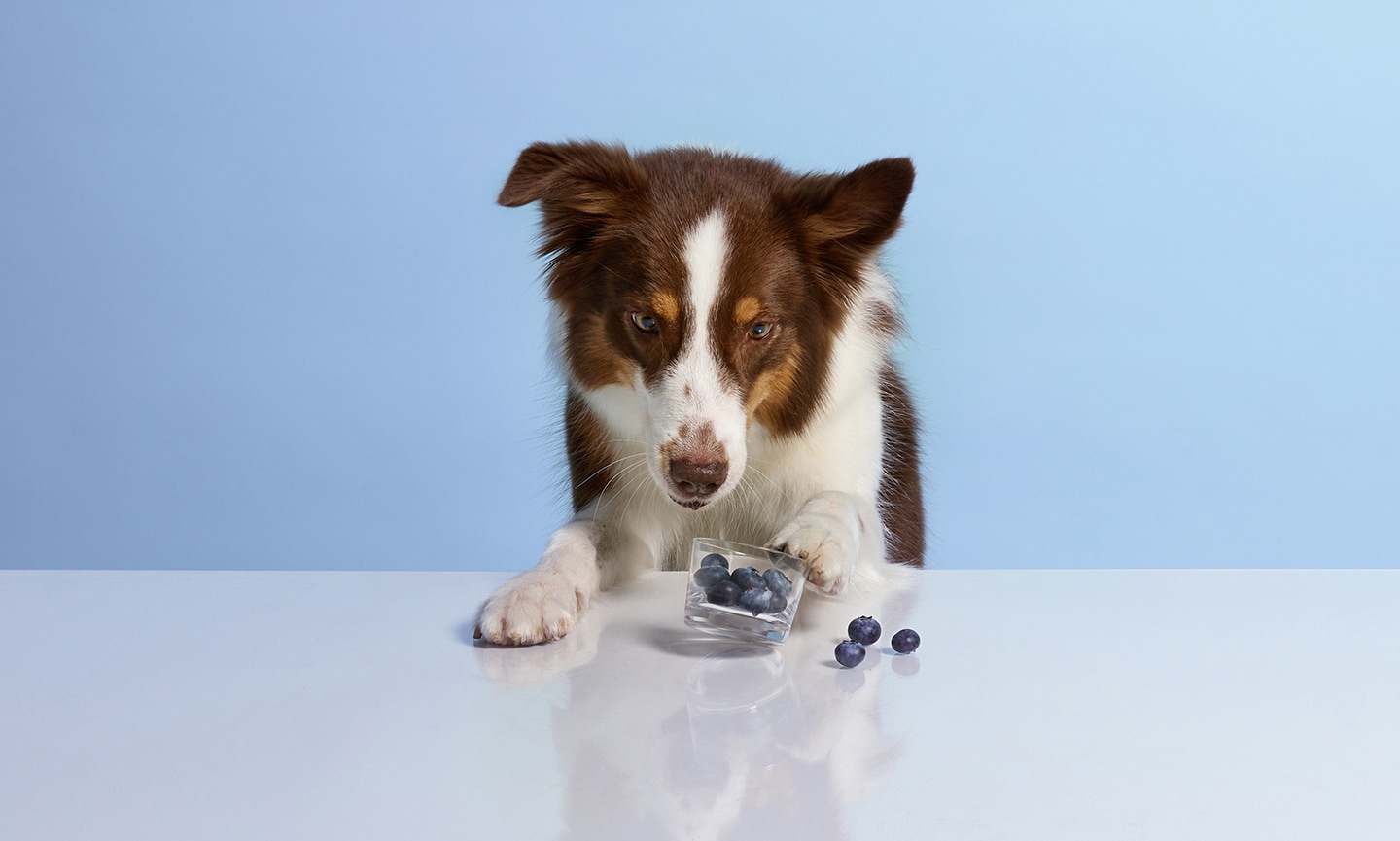
Broccoli
In small quantities, broccoli is not only safe for dogs, but it’s also a nutrient-rich superfood with many health benefits.
- This cruciferous veggie boasts several minerals, including potassium, magnesium and sodium, all of which are all vital for your dog’s hormone health and metabolism.
- It’s also packed with vitamins K and C, which helps keep your dog’s bones strong and boosts their immune system.
Corn
As a good source of carbohydrates and insoluble fiber, corn can be a nutritious addition to your dog’s balanced diet.
Only feed your dog plain corn (that means no butter, salt or pepper!), and don’t let your dog have the corn cob, as it can pose a choking hazard.
Cranberries
Cranberries are a dog-safe food packed with antioxidants and quercetin, a plant pigment that can help boost your pup’s immune system.
Feed your canine companion fresh cranberries only, as dried and canned cranberries are usually loaded with sugar.
Cucumbers
Composed of 95 percent water, cucumbers are a hydrating, dog-safe food that provides vitamins and minerals essential to a dog’s balanced diet. These include magnesium, potassium and vitamins C, B and K.
While not harmful, vets recommend removing the skin and seeds, as these may cause an upset tummy if your dog has a sensitive digestive system.
Eggs
Eggs are a nutrient-dense food that works well as a dog treat or as a portion of your pup’s regular daily diet.
They’re a great source of highly digestible protein, fatty acids and vitamin A.
Only feed plain cooked eggs to dogs (with the yolk)—that means no oil, butter, salt or other additives. Don’t exceed one egg a week.
Lettuce (and other greens)
While lettuce (such as romaine) is safe for dogs to eat and will provide your dog with some vitamins and fiber, there are better options if you want to introduce something healthy into your dog’s diet.
Options with a bigger nutritional punch include:
Learn more about lettuce for dogs.
Mango
Sweet and juicy, mango is high in fiber, proteins, antioxidants and minerals that benefit your dog’s health.
Small amounts of mango may also help alleviate an upset tummy, diarrhea and constipation.
Learn more about mango for dogs.
Oranges
While oranges might not be your dog’s first choice for a treat, this citrus fruit is safe and healthy for most dogs to eat in small amounts.
Oranges contain nutrients, like vitamin C and potassium, that positively affect a dog’s immune system.
Learn more about oranges for dogs.
Peanut Butter
This creamy spread is an excellent source of protein and healthy fats.
It’s also a good source of vitamin B6 and niacin—vital nutrients that support your dog’s enzyme and nervous system function, among other benefits.
When buying peanut butter, always read the ingredients list carefully and avoid any peanut butter containing the sugar substitute xylitol, as this ingredient can be highly toxic to dogs.
Learn more about peanut butter for dogs.
Peas
Peas are a common ingredient in dog food—and for good reason.
- They’re packed with vitamins and minerals that support your dog’s vision, skin, digestion, immune system, heart, nerves and more.
- They’re also low in calories and high in fiber.
It’s important to note that dogs with kidney problems should avoid peas.
Learn more about peas for dogs.
Pineapple
Pineapple is chock full of water, antioxidants and fiber, making it a healthy, dog-safe snack in moderation.
It’s also rich in vitamin C, vitamin B6 and other beneficial vitamins and minerals that support your dog’s coat, skin, eyesight, ligaments and tissues.
Never feed your dog the core or spiny skin of a pineapple—just raw, peeled pineapple flesh.
Learn more about pineapple for dogs.
Popcorn
Treating your dog to a few pieces of plain, air-popped popcorn is a safe treat high in fiber.
Avoid feeding your pup butter-flavored microwave popcorn, as it contains an artificial butter flavoring called diacetyl that may be harmful to dogs.
Learn more about popcorn for dogs.
Potatoes
Potatoes can be a healthy treat for dogs, as long as they’re peeled, well cooked, served plain and not green—sorry, pups, no fries or loaded potatoes for you!
Spuds are high in vitamins A, B6 and C, which help support your dog’s immune and nervous systems, among other benefits. They’re also rich in beneficial iron, magnesium, calcium and potassium.
Learn more about potatoes for dogs.
Sweet Potato
Due to their stellar nutritional profile, sweet potato is a common ingredient in dog food, like American Journey Salmon & Sweet Potato Recipe Grain-Free Dry Dog Food, and dog treats, like Hill's Grain-Free Soft-Baked Naturals with Beef & Sweet Potatoes Dog Treats.
- Most notably, this starchy, sweet root vegetable is high in beta-carotene, an antioxidant that supports your dog’s immune system, vision and skin.
- Sweet potatoes are also an excellent source of digestion-boosting fiber.
Only serve your dog plain, well-cooked sweet potato.
Learn more about sweet potatoes for dogs.
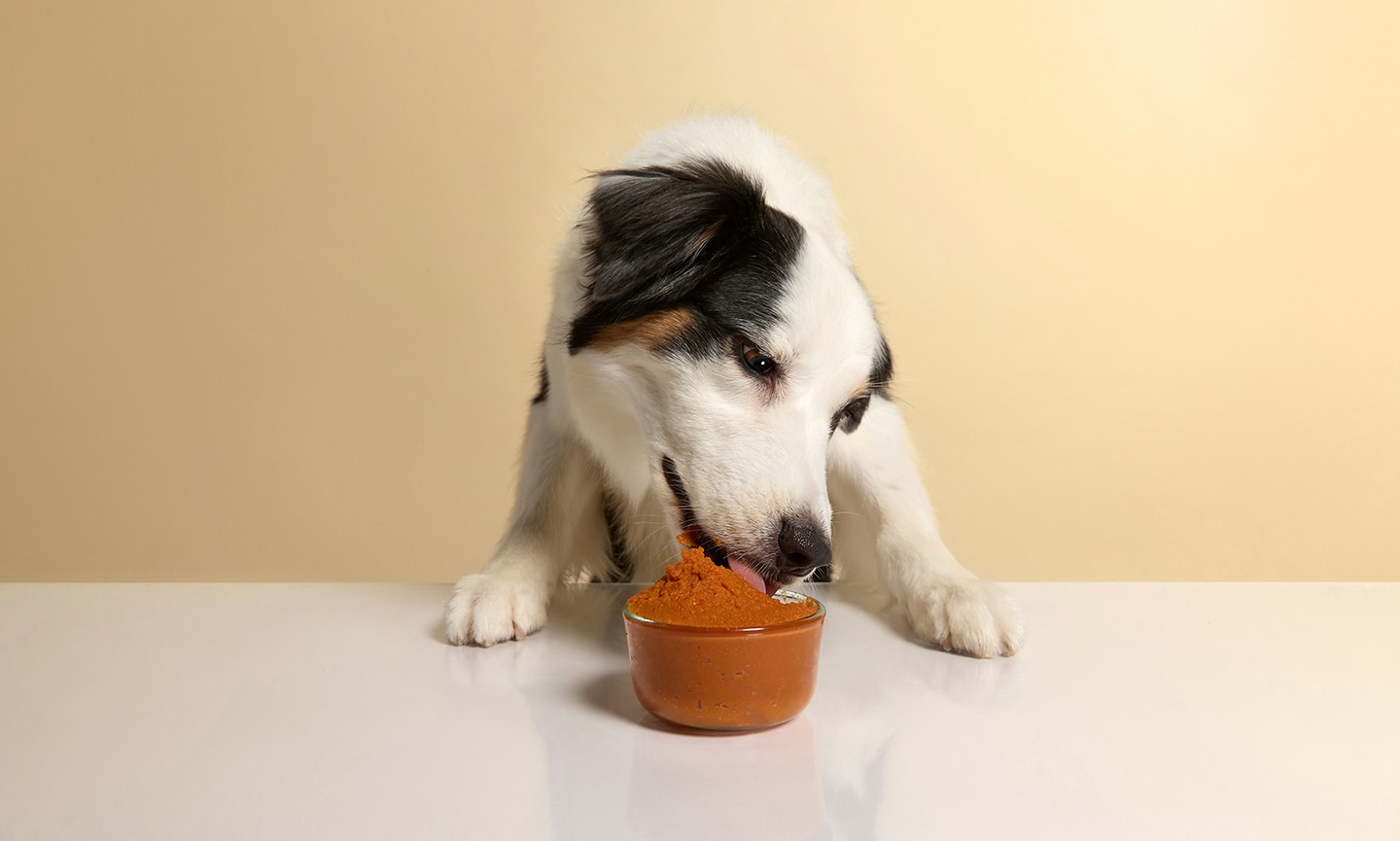
Pumpkin
Pumpkin is a dog-safe, antioxidant-rich food containing many health-promoting nutrients that can help with everything from a shinier coat to better eyesight to improved digestion.
As such, it’s no surprise that it’s a common ingredient in dog treats and dog food.
Learn more about pumpkin for dogs.
Pumpkin Seeds
While eating a few fresh pumpkin seeds won’t hurt your pup, dogs’ guts aren’t set up to digest seeds and they aren’t a part of their natural diet.
This means dogs can’t reap any of the nutritional benefits derived from pumpkin seeds the way humans can.
Learn more about pumpkin seeds for dogs.
Salmon (and other seafood and fish)
Salmon is safe for your dog to eat, as long as it’s deboned and properly cooked. The same goes for other types of seafood and fish, like lobster and trout.
Seafood and fish are an excellent source of protein and omega-3 fatty acids, which benefit your pup’s skin, digestion and immune system.
Learn more about salmon (and other types of fish and seafood) for dogs.
Strawberries
Unsweetened fresh or frozen strawberries offer dogs many nutritional benefits.
- They’re high in immune-boosting vitamins B1, B6, C and K.
- They’re also loaded with fiber to aid in digestion and contain omega-3 fatty acids for skin and coat health.
Learn more about strawberries for dogs.
Tomatoes
Red tomatoes (raw or cooked) that are ripe and plain make a nutritious and delicious snack for your pup.
They’re loaded with potassium, antioxidants and vitamins A, C and K, which benefit your dog’s eyesight, skin, immune system, cardiovascular health, muscles and more.
Learn more about tomatoes for dogs.
Yogurt
Plain, unflavored, non- or low-fat yogurt can be a healthy treat for your pup, as long as they don’t have issues digesting lactose.
- Yogurt is high in protein, which supports muscles, bones and tissues.
- It’s also rich in bone-building calcium and probiotics that may contribute to a healthy gut microbiome.
Learn more about yogurt for dogs.
Zucchini
High in antioxidants and fiber, zucchini makes a healthy, low-calorie treat for your pup.
It’s abundant in vitamins A, B6, C and K, which are essential for your dog’s vision, skin, coat, metabolism, proper blood clotting and bone and cartilage growth.
Raw zucchini can be difficult for your dog to digest, so it’s best to serve it cooked.
Learn more about zucchini for dogs and other veggies dogs can eat.
How to Feed Dogs Human Foods
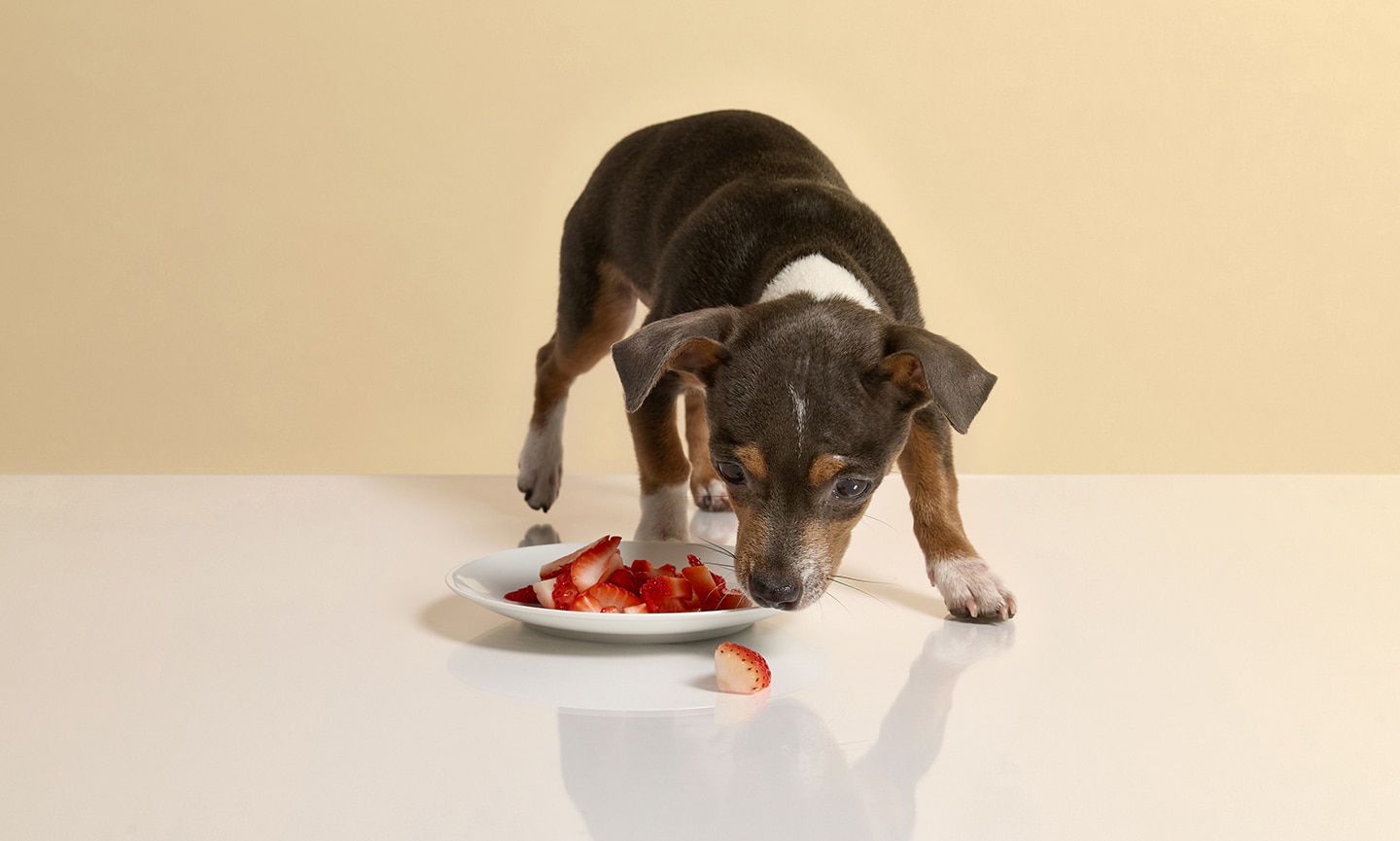
If your dog appears to be gaining weight due to human food treats, reduce the number of treats you’re feeding them. And if you notice any digestion issues due to a new food, scale back the amount of that food next time. If tummy troubles or other adverse effects continue, avoid giving your dog that food in the future.
And remember, before introducing any new food into your dog’s diet, always check with your veterinarian.
Share:
